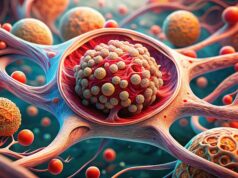
A study published online ahead of print in CardioVascular and Interventional Radiology (CVIR) has demonstrated that at one year, uterine fibroid embolization significantly improves all aspects of sexual function and quality of life for patients who undergo the minimally invasive treatment.
Investigators on the EFUZEN study, Hélène Vernhet Kovacsik, Marc Sapoval and colleagues from the French Society of Interventional and Cardiovascular Imaging (SFICV) research group, set out to evaluate sexual function before, and a year after, fibroid embolization.
As reported in CVIR, the secondary goals of the study were to evaluate the quality of life before, and one year after embolization, and to determine any correlation or relationship between imaging findings (MRI data) before and three to six months after embolization to changes in sexual function and quality of life.
EFUZEN was a prospective, multicentre observational study that enrolled 264 consecutive symptomatic women who underwent uterine fibroid embolization. The women were treated using Embozene (Celonova/Boston Scientific) from March 2012 to May 2013.
Vernhet Kovacsik and colleagues calculated the sexual function score and the quality of life score using the previously validated Female Sexual Function Index (FSFI) by Rosen and UFS-QOL by Spies, respectively, before and one year after the interventional procedure.
They also performed MRI before and three to six months after embolization recording the uterine and main fibroid volume and percentage of fibroid enhancement after injection of gadolinium. They also looked for a relationship between the imaging data before and after embolization, sexual function scores and quality of life scores.
The investigators obtained Female Sexual Function Index data in 170 women. They also obtained quality of life data in 192 women. One year after embolization, 78.8% saw an improvement of sexual function score; at the same time point, 90.2% of women saw an improvement in quality of life scores. Nearly 85% saw an improvement in symptom severity. However, the study was unable to establish a relationship between reduction in the main fibroid, or decrease of fibroid enhancement and quality of life and sexual function scores.













